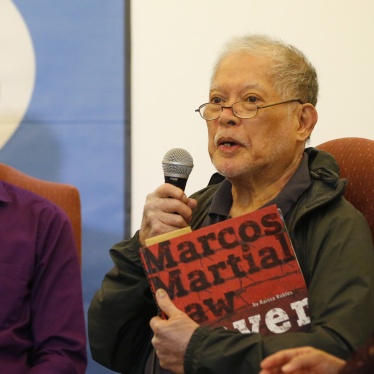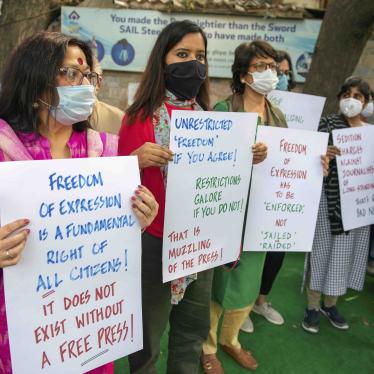Brussels
Your Excellency,
We write to urge that human rights be prominent on the agenda for your visit to China from October 8-12, 2004. We respectfully urge that as part of France’s efforts to promote universal adherence to international rights standards, you raise the issue of China’s dismal record in all your official meetings. We urge further that you use this important trip to publicly stress how necessary human rights protections and the rule of law are to the growth of a favorable investment environment in China.
For years, many in the international business community have made the argument that investment in China will fuel the rise of a middle class; that its members will demand a well-established rule of law and better human rights protections; that the government will have no choice but to accede to the new demands; and that the ensuing climate will simultaneously ensure human rights and nation-wide stability.
While there are some signs of progress, China’s growing wealth is increasingly creating stark inequalities, which, coupled with the lack of basic rights protections and avenues to express grievances peacefully, are fuelling rising social unrest.
Although President Hu Jintao and Premier Wen Jiabao promised to address the causes of this unrest, no fundamental reforms have taken place. Indeed, there has been an upsurge in restrictions on:
- freedom of expression, especially in relation to the Internet;
- protestors peacefully agitating for redress on grievances related to housing rights, labor rights, police abuse, and access to health care;
- Uighurs in the Xinjiang Autonomous Region and;
- Tibetans in the Tibet Autonomous Region and neighboring provinces.
Two factors underlie the lack of fundamental reform: the concern of China’s leaders with the possibility of political instability and a related diminution of the Communist Party’s monopoly on power, and China’s confidence that business opportunities in China are more important to Western governments and investors than human rights and the rule of law.
Mr. President, we urge you to prove that the last point is incorrect in your upcoming trip. In your discussions with your Chinese counterparts, we urge you to raise the following issues and suggest the following remedial steps:
- Although the Chinese leadership has repeatedly said that the Chinese legal system is based on the rule of law, it is still seriously flawed and the law regularly is trumped by national and local political considerations. While there have been commendable efforts to strengthen the legal system in recent years, broad and vague legal language permits the laws to be applied arbitrarily. Party officials have the power to intercede at every level of the judicial system. Many are themselves beyond the reach of the law. The lack of checks and balances within a one-party system breeds a culture of corruption and despite current attempts to reform the police, officers often act as private collection and protection troops for local officials.
The issues affect the business community in several ways. Corruption is costly. Legal decisions cannot be enforced. The judicial process itself is heavily weighted in favor of the prosecution. Lawyers who robustly defend clients against the wishes of officials have been forced to abandon their profession. The absence of a free press, and thus access to relatively complete business news, makes it difficult for businesses to evaluate investment opportunities.
Human Rights Watch recommends that France urge China to ensure that lawyers are fully able to carry out their roles as counsel without improper interference from the government. In addition, we recommend that you urge the removal of mechanisms that give Party Secretaries and Committees special input into legal and judicial decisions.
- A European Union arms embargo was enacted in response to the suppression of protesters in Tiananmen Square on June 3-4, 1989. To date, no one has been held accountable for the large number of deaths or the decision to use force to quell what the Chinese government still labels a counterrevolutionary rebellion. Some protesters are still imprisoned, sentenced on the basis of trials that did not meet international standards. Others, such as Ding Xilin, who organized the Tiananmen Mothers to call for reparations and the right to publicly mourn, are continually harassed. In June 2004, the 72-year old Dr. Jiang Yanyong, who came to international attention in 2003 when he revealed the cover-up of the SARS epidemic in Beijing, was detained and subject to thought reform for asking for a reevaluation of the Tiananmen verdict. He was on duty at a military hospital the night of the crackdown.
We urge you to reverse your expressed position of unconditionally lifting the current E.U. arms embargo. We are convinced that a continuation of the E.U.’s arms embargo is of utmost importance until the Chinese leadership addresses issues of accountability, reparations, and fair trials.
- As many as a million Chinese farmers contracted HIV in the 1990s through blood collection centers run by health department officials and their relatives. In Henan province, senior officials covered up the epidemic for years, harassed critics and protestors, and expelled Chinese and international journalists attempting to report the story. No Henan official has been brought to account. Some have been promoted; some are administering domestic and international aid funds.
The deaths in Henan have left behind impoverished orphans and destroyed communities. Many HIV-positive children cannot afford school fees; those who can are often turned away by fearful school officials. Student volunteers and grass-roots collectives have tried to fill the gap. However, Henan officials resent them for attracting international attention to the province's AIDS crisis and to the government's failure to address it. In 2004, provincial officials closed three nonprofit facilities for AIDS affected children.
France is a major contributor to the Global Fund to Fight AIDS, Tuberculosis and Malaria, an organization which has promised to fund AIDS care in China. We thus urge you to take the lead in pressing for an investigation and full accountability for the Henan blood scandal.
China is cracking down on Muslin Uighurs in China’s northwestern Xinjiang Uighur Autonomous Region in the name of the “global war on terror”. Although some Uighurs in the region advocate for full independence from China, others favor respect for the legal autonomy intended under Chinese law on autonomous regions. Some of those supporting independence have employed violence for political ends; the vast majority have not. The Chinese government has chosen to label Uighurs who try to assert political, religious, or cultural autonomy through any but party and government-approved institutions as “terrorists” or criminals. In addition, the alleged presence of terrorists in Xinjiang has been used as a pretext for cracking down on freedom of expression, association, and religion. Tensions in the region are exacerbated by the economic marginalization of the Uighur population in light of official policies to encourage the in-migration of ethnic Han.
In 2004, at least five Uighurs were executed, and in mid-September, the ranking official in Xinjiang said that during an eight-month period the courts had sentenced 50 to death. He said that they had not yet been executed. No additional information has been forthcoming.
Consistent with French policy that any anti-terror measures must be conducted in full accordance with international law, we urge you during your trip to reject the language of “terrorism” in describing Uighur separatism, to press for an end to prosecution of Uighurs for engaging in independent cultural and religious activity or peacefully advocating for political independence or autonomy, and to urge China to fully protect the rights of Uighurs to free expression, association, and religion in accordance with international standards.
- The human rights situation in Tibet continues to be extremely poor and requires vigilance. The number of monks in any given monastery and the total number in all of Tibet continue to be restricted. Mandatory patriotic re-education regularly occurs in monasteries and nunneries. Monks and nuns who refuse to acknowledge that Tibet has always been a part of China, or who maintain allegiance to, or refuse to denounce, the Panchen Lama acknowledged by the Dalai Lama risk expulsion. The government and party continue to interfere in other purely religious matters.
Peacefully advocating for a free Tibet or hoisting the banned Tibetan flag can result in torture and imprisonment. New cases continue to come to the attention of Human Rights Watch.
In addition, there have been reports that villagers are forced to relocate their residences to accommodate resource extraction and hydroelectric projects and the reclamation of degraded land. Many rural Tibetans have been forced to migrate to urban areas to try to earn a living. However, language difficulties, functional illiteracy, and lack of appropriate skills have made it difficult for Tibetans to find jobs.
Mr. President, we urge you to request that the Chinese government refrain from interference in religious affairs, and that it respect Tibetans’ right to free expression, including their right to peacefully advocate for Tibetan independence. We urge that Chinese laws and regulations be made fully consistent with the U.N. Convention against Torture and Other Cruel Inhuman or Degrading Treatment or Punishment, which China ratified in 1988.
We wish you a fruitful journey to China.
Sincerely,
Brad Adams
Executive Director
Human Rights Watch, Asia Division
Lotte Leicht
Brussels Director
Human Rights Watch







